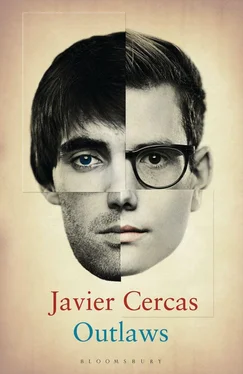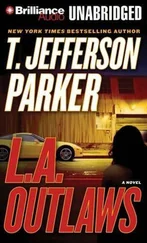‘We looked at each other for a moment. Tere leaned on the hood of a car parked next to us and explained that Guille had been talking for some time about a housing development in Lloret, that it was the perfect place to rob because it was really isolated and the owners were rich people, and it was the perfect moment too because June wasn’t over yet and lots of houses were still empty, waiting for their owners to come and stay for July and August. Finally she said that Zarco was going to do a job there and needed me to help him. Then she changed the singular for the plural: You’ll help us, right? I had no intention of helping them and, to gain time, for a moment I thought of asking her why Zarco didn’t ask me himself, why he sent her to ask me; instead of beating about the bush I said: I’m sorry. I can’t. Tere opened her arms and looked at me with astonishment that struck me as genuine. Why? she asked. The only thing that occurred to me was to answer the same way I’d answered Zarco. Because I’m not like you guys, I said. I’ve never done that. You’ve never done what? she asked. Stolen anything, I answered. Nobody’s asking you to steal, she said. We’re the ones who’re going to do the stealing. What you have to do is something else. And it’s dead easy, so easy that it’s almost nothing. So why doesn’t somebody else do it then? I asked. Because we need someone like you, she answered. Someone who speaks Catalan and looks like a good kid. Come on, Gafitas, for fuck’s sake: are you going to leave us high and dry after what Zarco did for you? Pay us what you owe and we’ll be even. She fell quiet. The streetlamps of Bonastruc de Porta had been on for a while and they tinged Tere’s dark hair, her green eyes, her red, full lips with their golden light. What do you say? she asked. I looked behind her at the closed blinds of the Vilaró arcade and thought that, if I said no, I’d never see Tere again; I felt my legs go weak as I said: What do I have to do?
‘I don’t remember exactly what Tere’s reply was; only that she assured me that the next day Zarco would explain what I had to do and that she said goodbye with two sentences. Be on time. Tomorrow at La Font at three. I spent a horrible night wondering whether to go or not, deciding not to go and then a minute later deciding to go. In the end I went, and before three in the afternoon I was already at La Font. A little while later Zarco arrived and Tere, wearing a pair of shorts that revealed her long, tanned legs; Guille was the last to show up. Zarco wasn’t surprised by my presence there, didn’t explain what it was we were going to do, and I didn’t ask him either; I was too worried. As we left the district, Zarco, Tere and Guille started checking out the cars parked along the streets and, when we came up to a Seat 124 parked in a solitary alley that led out onto Pedret Avenue, Tere took a small sawblade with a hook on one end out of her bag and handed it to Zarco while Guille took off running up to the next sidestreet; then Tere ran to the one behind us. I stayed with Zarco and saw him stick the sawblade into the slot between the Seat 124’s door and window and, after feeling around for a couple of seconds with the blade, I heard a click and the door opened. Zarco sat in the driver’s seat, yanked the steering wheel around, reached underneath it and brought out a handful of wires, connected one wire to another, touched another wire to them and the engine immediately started. The whole operation lasted a minute, maybe less than a minute. A little while later we were on our way out of the other side of the city riding in the 124.
‘We arrived in Lloret around four. We drove in on a wide street that led to the centre, flanked by souvenir shops, cheap restaurants, closed discotheques and groups of tourists in flip-flops and swimsuits, and when we came to the sea we turned left and followed a promenade dotted with patio bars that ran parallel to the beach. Finally we turned left again, drove away from the sea for a moment and then came back towards it up a winding road that clung to the cliffs, until we saw a sign that said: La Montgoda. It’s here, said Guille, and Zarco parked the car on a slope, at the entrance to the housing development; then he turned around to face the back seat and started to explain what I had to do while Tere took a comb, an eyebrow pencil and lipstick out of her bag. I don’t know if I understood Zarco’s whole explanation, but when he asked me if I’d understood I answered yes; then he said: OK, now forget everything I told you and just do what you see Tere doing. I said yes again, and at that moment Guille caught my eye in the rear-view mirror. Gafitas is shitting himself, he scoffed. All the bastard can say is yes. Zarco told him to shut up while I turned and looked helplessly at Tere and Tere winked at me while carrying on combing her hair. Zarco added: And you, Gafitas, don’t let it get to you: do what I told you and everything’ll be fine. OK? I was about to say yes again, but I just nodded my head.
‘Once she’d finished getting ready, Tere put her comb, eyeliner and lipstick back in her bag and said: Let’s go. When we got out of the car she took me by the hand and we started walking up the badly paved slope. The housing development seemed deserted; the only noise we could hear was the sound of the sea. When we saw the first house appear among the pine trees, Tere instructed me. Let me do the talking, she said. Nobody’s going to say anything to you, but, if someone speaks in Catalan, you talk. If not, keep quiet. Do what I do. Most of all, whatever happens, stay with me. And one more thing: is what Guille said true? My heart was beating through my ribs like a caged bird; I’d started to sweat, and Tere’s hand was slipping in my soaking wet hand; I managed to say: Yes. Tere laughed; I laughed too, and that simultaneous laughter filled me with courage.
‘We got to the first house, walked through the garden and Tere rang the doorbell. The door opened and a woman who looked like she’d just got out of bed questioned us in silence, with her eyes half-closed against the strong sun; Tere answered the questioning look with a question: she asked if Pablo was home. Unexpectedly friendly, the woman answered that no one called Pablo lived in that house, and Tere apologized. We left the garden and walked down the street. How’s it going? asked Tere. How’s what going? I asked. How’s everything going? she clarified. I don’t know, I said, truthfully. Does that mean you’re not nervous any more? she asked. More or less, I answered. Then stop squeezing my hand, would you, she said. You’re going to break it. I let go of her hand and dried mine on my trousers, but she was soon holding it again. We didn’t call at the house next door or the next one, but at the one after that we tried again. This door opened too, this time an old man in a T-shirt with whom Tere exchanged a series of questions and answers similar to the exchange she’d had with the first woman, only longer; in fact, at one point it seemed to me that the old man, who couldn’t take his eyes off Tere’s legs, was undressing her in his mind and that, instead of trying to cut short the dialogue, he was trying to lengthen it.
‘The third house we tried was the one. Nobody answered when we rang the bell and, as soon as we made sure the villa was empty, that the villa next door was empty and that on the other side of the villa next door there was nothing but a brick wall behind which was a vacant lot full of shrubs, we walked back to the entrance of the development, where Zarco and Guille were waiting for us in the 124. Go up to the end of the street, Tere said to Zarco, who started up the car as soon as we got in. It’s the last house on the right. As we drove into the development in slow motion, Tere answered questions from Zarco and Guille and, after a Citroën with a woman and two children in it passed us on its way out, we arrived at the brick wall at the end, and parked in front of the door with the car facing back the way we came.
Читать дальше












